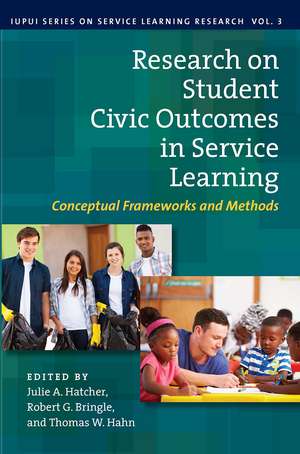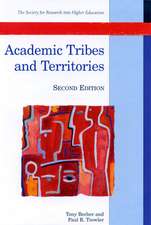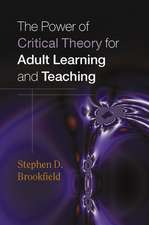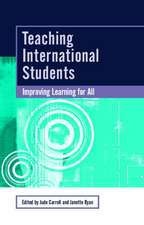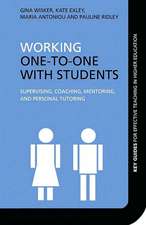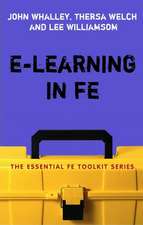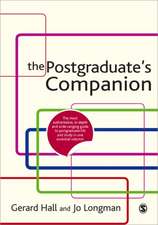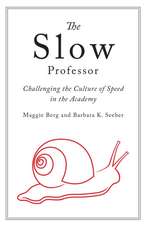Research on Student Civic Outcomes in Service Learning: Conceptual Frameworks and Methods
Editat de Julie A. Hatcher, Robert G. Bringle, Thomas W. Hahnen Limba Engleză Paperback – 7 noi 2016
| Toate formatele și edițiile | Preț | Express |
|---|---|---|
| Paperback (1) | 354.39 lei 6-8 săpt. | |
| Taylor & Francis – 7 noi 2016 | 354.39 lei 6-8 săpt. | |
| Hardback (1) | 1005.80 lei 6-8 săpt. | |
| Taylor & Francis – 30 noi 2016 | 1005.80 lei 6-8 săpt. |
Preț: 354.39 lei
Nou
Puncte Express: 532
Preț estimativ în valută:
67.81€ • 73.89$ • 57.14£
67.81€ • 73.89$ • 57.14£
Carte tipărită la comandă
Livrare economică 23 aprilie-07 mai
Preluare comenzi: 021 569.72.76
Specificații
ISBN-13: 9781579223434
ISBN-10: 1579223435
Pagini: 392
Dimensiuni: 152 x 229 x 28 mm
Greutate: 0.57 kg
Ediția:1
Editura: Taylor & Francis
Colecția Routledge
Locul publicării:Oxford, United Kingdom
ISBN-10: 1579223435
Pagini: 392
Dimensiuni: 152 x 229 x 28 mm
Greutate: 0.57 kg
Ediția:1
Editura: Taylor & Francis
Colecția Routledge
Locul publicării:Oxford, United Kingdom
Public țintă
PostgraduateNotă biografică
Julie A. Hatcher is Associate Professor Emeritus of Philanthropic Studies in the Lilly Family School of Philanthropy at Indiana University Purdue University Indianapolis (IUPUI). From 2012-2018, she was executive director of the Center for Service and Learning and associate professor. Julie serves as co-editor of the IUPUI Series on Service Learning Research (Stylus, 2011, 2013, 2016). Her research focuses on the role of higher education in democracy and civil society, civic learning outcomes in higher education, philanthropic studies, and civic-minded professionals. She serves on the national advisory board for the Carnegie Foundation’s Community Engagement elective classification. Julie is the 2017 International Association for Research on Service-Learning and Community Engagement Distinguished Career Award recipient, and the 2008 Dissertation Award recipient. Julie earned her PhD in philanthropic studies with a minor in higher education at Indiana University. Robert G. Bringle is Chancellor’s Professor Emeritus of Psychology and Philanthropic Studies and Senior Scholar in the Center for Service and Learning at Indiana University Purdue University Indianapolis. From 2012-2015, he was the Kulynych/Cline Visiting Distinguished Professor of Psychology at Appalachian State University. He was the Executive Director of the Indiana University Purdue University Indianapolis Center for Service and Learning from 1994-2012. Dr. Bringle was awarded the Thomas Ehrlich Faculty Award for Service Learning, the IUPUI Chancellor’s Award for Excellence in Teaching, and the Legacy of Service Award from Indiana Campus Compact. In 2004, he was recognized at the 4th Annual International Service-Learning Research Conference for his outstanding contributions to the service-learning research field. The University of the Free State, South Africa, awarded him an honorary doctorate for his scholarly work on civic engagement and service learning. Thomas W. Hahn is the Director o
Cuprins
PART ONE. SERVICE LEARNING AND STUDENT CIVIC OUTCOMES 1.1 Introduction to Research on Service Learning and Student Civic Outcomes—Julie A. Hatcher, Robert G. Bringle, and Thomas W. Hahn 1.2 Civic Outcomes in Higher Education—Kevin M. Hemer and Robert D. Reason 1.3 Civic Learning in Higher Education—Patti H. Clayton and Stephanie Stokamer PART TWO. THEORETICAL FRAMEWORKS FOR RESEARCH ON SERVICE LEARNING AND STUDENT CIVIC OUTCOMES 2.1 Social Psychology and Civic Outcomes—Robert G. Bringle 2.2 Political Theory and Civic Outcomes—Steven G. Jones 2.3 Educational Theory and Civic Outcomes—Marcia Baxter-Magolda and Lisa Boes 2.4 Philanthropic Studies and Civic Outcomes—Julie A. Hatcher 2.5 Well-being and Civic Outcomes—Claire Berezowitz, Alisa Pykett, Victoria Faust, and Connie Flanagan 2.6 Critical Theories and Civic Outcomes—Tania D. Mitchell and Colleen Rost-Banik 2.7 Boundary Zone Perspectives and Civic Outcomes—Janice McMillan PART THREE. CONDUCTING RESEARCH ON SERVICE LEARNING AND STUDENT CIVIC OUTCOMES 3.1 Quantitative Research on Service Learning and Civic Outcomes—Dan Richard 3.2 Qualitative Research on Service Learning and Civic Outcomes—Susan R. Jones and Zak Foste 3.3 Cross- institutional Research on Civic Outcomes—Emily M. Janke and Jennifer M. Domagal-Goldman 3.4 Longitudinal Research on Civic Outcomes—Patrick L. Hill, Kira Pasquesi, Nicholas A. Bowman, and Jay W. Brandenberger 3.5 Documenting and Gathering Authentic Evidence of Civic Outcomes—Ashley Finley and Terrel Rhodes 3.6 Enhancing Research on Civic Outcomes Using Local and National Data Sets—Steven S. Graunke and Michele J. Hansen
Recenzii
“Research on Student Civic Outcomes in Service Learning: Conceptual Frameworks and Methods is the third volume in a series dedicated to research on service learning. This volume, with its timely focus on civic outcomes, is divided into three sections. It begins with an introduction to how student learning outcomes are embedded in service learning, then moves on to various theoretical frameworks by which one can situate research. It concludes with some nuts and bolts aspects of conducting research on student civic outcomes in service learning, defined as “a course or competency-based, credit-bearing educational experience in which students (a) participate in mutually identified service activities that benefit the community, and (b) reflect on the service activity in such a way as to gain further understanding of course content, a broader appreciation of the discipline, and an enhanced sense of personal values and civic responsibility.
The volume is worthwhile for teachers and researchers who want to improve students’ service learning as a site for civic engagement."
Reflective Teaching (Wabash Center)
The volume is worthwhile for teachers and researchers who want to improve students’ service learning as a site for civic engagement."
Reflective Teaching (Wabash Center)
Descriere
This volume presents research on--and deepens understanding of--teaching strategies that foster the knowledge, skills and dispositions of college graduates to be actively engaged in their communities as citizens and civic-minded professionals.
